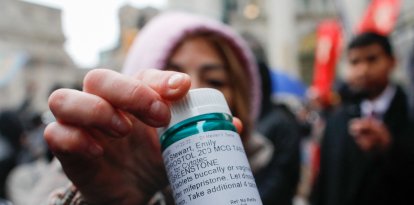Oregon ends decriminalization of hard drugs
The progressive experiment raised consumption and mortality figures and was ultimately rejected by citizens, who only three years ago voted to make it law.

Street corner in Portland, Ore., after drug decriminalization.
This Sunday marks the end of Oregon's progressive experiment to decriminalize hard drug use just three years after a majority of voters approved the rule.
Gov. Tina Kotek enacted a law to make it a misdemeanor to possess drugs such as methamphetamines, heroin and LSD. Months after defending the law because it at least brought the issue of addiction into the public discourse, Kotek acknowledged its failure in October: "I am very progressive when it comes to public policy, but I am pragmatic and I’m tired of things not working."
Some 58.46% of the state electorate approved Rule 110 under the slogan "treatment over incarceration." The measure did not, in truth, legalize the use of addictive substances such as fentanyl, methamphetamine or heroin. But it did lower their consequences, eliminating incarceration in place of fines of up to $100. This amount could be reduced to zero if the offender sought treatment for addiction within 45 days.
It also sought to improve social services and support to treat addiction, drawing on dollars raised from taxes on marijuana (legalized for recreational use in 2015) and the savings it would generate due to fewer arrests and incarcerations.
More than three years later, most Oregonians agree it was a mistake: 56% supported full repeal of the measure late last year, an Emerson College Polling survey revealed.
Half claimed that Rule 110 had made communities more unsafe, while only 20% said they felt safer. Sixty-four percent preferred to remove the decriminalization parts rather than leave the law as it was, while other parts, such as the free exchange of used needles for new ones, were less uniformly rated.
The figures of failure
Fentanyl deaths rose 1,500% since 2019, according to federal data analyzed by The Oregonian. That's the highest increase of any state in the country.
In 2023, Oregon went from 36th out of 39 in overdoses of the synthetic opioid to 17th. The state reached 30 deaths per 100,000 people.
The promise of "treatment over incarceration," the main attraction for those who voted for decriminalization, ended in alarming numbers. A public audit of the rule's performance revealed that Oregon ranked 50th in access to treatment. In addition, only 1% of people cited for substance possession were calling the hotline set up as part of the program for treatment information.

























